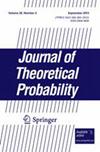分布相关二阶随机微分方程的哈纳克不等式
IF 0.6
4区 数学
Q3 STATISTICS & PROBABILITY
引用次数: 0
摘要
通过研究与分布相关的二阶随机微分方程相关的非线性半群 \(P_t^*\)的正则性,得出了当漂移在度量变量中为 Lipschitz 连续时的哈纳克不等式,该不等式是由\(\beta \)-Hölder连续(在退化分量上为\(\beta > \frac{2}{3}\),在非退化分量上为 Dini 的平方根连续的函数所引起的距离下的。这些结果扩展了现有结果,其中漂移在 \(L^2\)-Wasserstein 距离上是 Lipschitz 连续的。本文章由计算机程序翻译,如有差异,请以英文原文为准。
Harnack Inequality for Distribution Dependent Second-Order Stochastic Differential Equations
By investigating the regularity of the nonlinear semigroup \(P_t^*\) associated with the distribution dependent second-order stochastic differential equations, the Harnack inequality is derived when the drift is Lipschitz continuous in the measure variable under the distance induced by the functions being \(\beta \)-Hölder continuous (with \(\beta > \frac{2}{3}\)) on the degenerate component and square root of Dini continuous on the non-degenerate one. The results extend the existing ones in which the drift is Lipschitz continuous in \(L^2\)-Wasserstein distance.
求助全文
通过发布文献求助,成功后即可免费获取论文全文。
去求助
来源期刊

Journal of Theoretical Probability
数学-统计学与概率论
CiteScore
1.50
自引率
12.50%
发文量
65
审稿时长
6-12 weeks
期刊介绍:
Journal of Theoretical Probability publishes high-quality, original papers in all areas of probability theory, including probability on semigroups, groups, vector spaces, other abstract structures, and random matrices. This multidisciplinary quarterly provides mathematicians and researchers in physics, engineering, statistics, financial mathematics, and computer science with a peer-reviewed forum for the exchange of vital ideas in the field of theoretical probability.
 求助内容:
求助内容: 应助结果提醒方式:
应助结果提醒方式:


